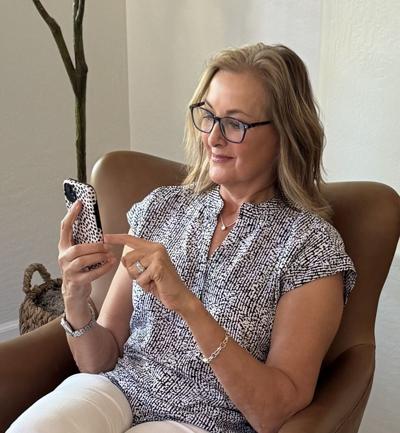To submit a letter to the editor, click here.
To pitch a ‘My Turn’ guest column, email jdalessio@news-gazette.com.
I was sitting in the waiting room at the doctor’s office recently when a woman answered her phone and immediately put the call on speaker. She chatted for several minutes, and although I tried to block it out, I could tell it was not an urgent call. I fought the impulse to give her the side-eye, and was relieved when she finally hung up.
Therein lies the downside of the smartphone. Is society as a whole becoming anti-social and rude at the hands of this ubiquitous technology? They aren’t going anywhere and are an integral part of our everyday lives, offering a multitude of conveniences — but at what cost?

The author caught wasting time scrolling on her iPhone.
Are we prioritizing phones over people?
Those of us old enough to remember life before these devices sometimes yearn for a simpler, less connected life. We managed with rotary dial landline phones as our connection to the outside world, while whole generations are growing up not knowing how to survive without smartphones. What we lacked in technology, we made up with human interaction, creativity and problem solving. Nowadays, social interaction seems to be a dying art.
Those of us with children or pets recognize the phenomenon when they suddenly act up and become needy when mom or dad — or human owner — is focused on their phone or laptop and not paying any attention to them. The child, pet or even spouse senses that we are prioritizing something over them.
There are endless memes and videos of pets behaving badly while their humans are on a Zoom call. They bark; they chew squeak toys; they destroy pillows. They feel displaced by that whatever device their owners are focusing on instead of them. The same goes for the people in our lives. No one likes feeling ignored or displaced.
What is it about our phones that cause us to overlook those living, breathing humans around us?
What keeps us scrolling when a family member walks into the room and we don’t even look up to acknowledge them?
What compels us to make sure our phones on the table are screen-side up after we sit down at a restaurant, to avoid missing some “important” text or notification?
Human interaction is crucial to our mental health and well-being. We need face-to-face actual eye-contact-making communication. We should be putting the phones down and giving our fellow human beings our attention. Attention that is not punctuated by swooshing and pinging notifications.
How many of us have been in a meeting while others scroll on their phone, thinking they are fooling everyone by holding it under the table?
How often are we subjected to a one-sided phone call — or if on speaker, the entire conversation, of someone at a checkout line in a store, or in the aforementioned waiting room?
How often do we comment about groups of teenagers or college kids walking together while staring at their own phones? It’s difficult for kids to learn and socially interact when their phones are constantly tempting them. Students need a break to learn and to interact with each other and with their teachers. Fortunately, many states have now banned cellphone use in schools — at least during class. This is a good start.
And we can all benefit from taking regular technology breaks. It takes discipline, but most people find they feel more relaxed and productive when they spend less time on their phone.
I’m not innocent when it comes to wasting time scrolling on social media or getting drawn in to a particularly entertaining Instagram algorithm. Because of that, I’ve come up with a few guidelines to cut down on my personal phone usage.
When I’m in a meeting, appointment or social gathering, I put my phone in my purse with the ringer turned off. If I’m expecting an important call, I’ll leave it on low, and if I need to take it, I’ll find a quiet spot to talk.
I limit speaker mode on calls to when I’m in the privacy of my own home or car, or when I’m outside where no one is in earshot.
If a call connects to CarPlay while I’m driving, and there are passengers in the car, I’ll keep it short or tell the caller I’ll get back to them later. It’s not fun sitting captive in a car while trying not to listen in on a call.
I use settings that limit notifications during certain times or block unknown text and emails — preventing those annoying early-morning or late-night notifications from other time zones.
I try to use the phone for things that actually make my life better: making appointments, paying bills, checking the weather, listening to podcasts, using maps to avoid getting lost, etc.
There’s so much to be gained when we are willing to put down our phones: quality time spent with family and friends, enjoying nature while not scrolling through social media, savoring a meal without the distraction of texts. The list goes on. Here’s to finding better balance with our phone usage — and with the people in our lives.
Your turn
Readers share their thoughts on cellphone pet peeves, habits and behaviors:
— Claire Prudhomme: “I think cellphones really have become like digital leashes. We carry them everywhere, check them constantly and often feel anxious when they’re not within reach. It’s like we’ve traded a bit of freedom for constant connection.
“Sometimes, it feels like we’re less present in the moment because our attention is always split between the here-and-now and the screen. I catch myself making it the first thing I reach for to start my day. Sad!”
— Rich Montgomery: “People who hold nonessential personal conversations on speaker phone or over Bluetooth in public or work settings are annoying; however, my unique peeve is people who complain about people being on their phones all the time.
“For better or worse, frequent phone usage has become a fact of life in modern society. People have become perfectly capable of multi-tasking while carrying on conversations, and, unless the phone is actively interfering with conversation, I think it’s selfish for people to demand that others put down their phones and give them their undivided attention.”
— Amy Waller: “I gave up Facebook and Instagram for Lent and don’t miss them at all. It has kept me off my cellphone considerably. I still don’t want to be without my phone because I feel like I need to be connected via text or calls, but it has been very freeing not to scroll through Instagram videos, etc.”
— Kim Arnold: “My pet peeve: when someone has a really loud obnoxious song/ringtone, their phone volume turned up high, and then it rings in a public place and they sit there and examine it like they’ve never seen who’s calling before while the song continues to play. If you’re not going to answer it right away or shut the volume down, then don’t have it on like that in a public place.”
— Kathy Young: “I don’t like to have a conversation when the other person puts me on speaker in a public setting. My father-in-law used to do this to me, and then want to discuss his finances. I learned to ask him where he was before discussing anything of that nature.”
— Peter Tomaras: “My pet peeves are people walking through stores talking loudly or on speaker; people on phones at restaurants; phones in classrooms; people head down over phones everywhere. But on balance, they are a benefit to all. I’d say they shouldn’t be used in church, but today many parishioners follow our liturgy on phones.”
— Karen Walker: “A different kind of complaint — not about phone users, but about those who assume you are as tethered to your phone as they are: People who use a text instead of a phone call to send information that you need immediately — then blame you if you didn’t see it in time. People who go nuts if you don’t answer any text — even the ‘unimportant’ ones — within 30 seconds.
“Service providers that make it virtually impossible to contact them or access your account information unless you go through a phone app. Websites and online services that force you to find your phone and wait for a text code to log in.”








